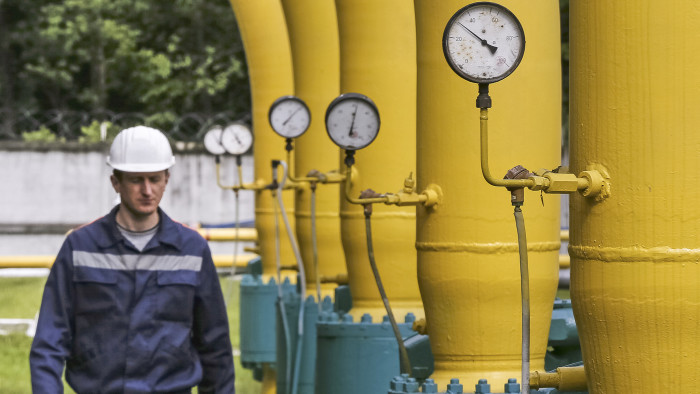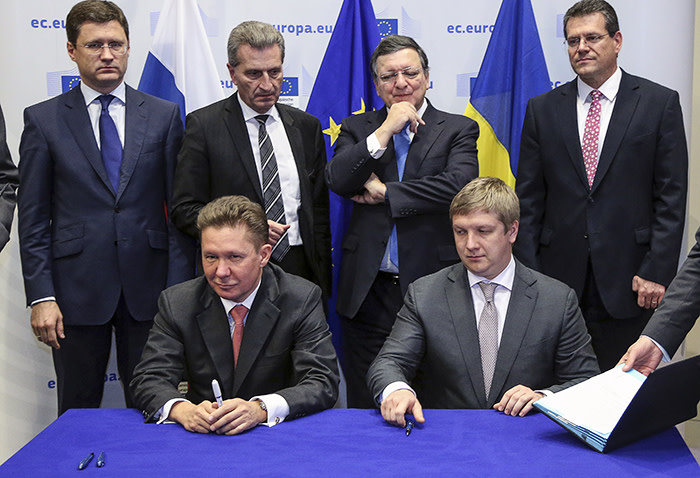Courtroom contest over Crimea energy assets

Roula Khalaf, Editor of the FT, selects her favourite stories in this weekly newsletter.
While the past five years have seen fierce military battles for territory on the steppe of Donbas, another contest of great significance for Ukraine has played out in Europe’s courtrooms.
In Sweden and the Netherlands, Ukrainian lawyers have successfully defended their country’s industrial assets from Russian counterparts in a series of arbitrations.
At the centre of this legal tussle has been Kiev-based law firm Aequo, which started approaching Ukrainian businesses six months after Russia’s annexation of Crimea in March 2014. Its plan was to help protect their assets on the south-eastern Ukrainian peninsula from expropriation by Moscow.
One of the biggest losers in the annexation was Naftogaz, Ukraine’s state-owned energy company, which lost control of offshore and onshore gasfields to Russia. It therefore decided in late 2015 to pursue claims against the Russian Federation.
Naftogaz appointed US law firm Covington & Burling and co-counsel Aequo. “At that time, it was difficult to find a reputable and experienced law firm in Ukraine, which was not conflicted, to act against Russia and Russian state companies,” says Pavlo Byelousov, a partner at Aequo and head of its international arbitration and cross-border litigation. International law firms were also reluctant to act, as those with offices in Russia were concerned about staff safety and future operations in that country.
Moreover, few counsel believed a legal victory over Russia with regard to Crimean claims was achievable or enforceable. Aequo and Covington & Burling therefore adopted an unusual, ultimately successful legal argument, under the Russia-Ukraine bilateral investment treaty (BIT), leading to a partial award against Russia by an international court in The Hague in the Netherlands in February 2019.
The amount of damages will be set at the next stage of the arbitration. Naftogaz estimates the value of group assets expropriated by Russia in Crimea at around $5bn plus interest.

Rather than asking the court to rule on the status of Crimea under international law, Mr Byelousov argued that “Russia is liable for any and all losses to Ukrainian and foreign investors [resulting] from the annexation of Crimea, since Russia assumed physical and effective control and jurisdiction over Crimea by formally annexing and admitting it” into its territory.
Aequo did not plunge blindly into this legal cauldron. It already knew both protagonists well. The firm had acted for Naftogaz before, having been engaged by Norwegian lead counsel Wikborg Rein during a Stockholm Chamber of Commerce arbitration over gas supply and transit contracts. It will also act for the Ukrainian supplier in a new arbitration initiated by Gazprom.
“Ukrainian lawyers in both litigation and arbitration, working with European and US firms, are enjoying huge successes in the international courts, showing their quality, innovation and customer service,” says Andy Hunder, president of the American Chamber of Commerce in Ukraine. “Some of them find it harder to fight a case for their clients in a local court, as Ukraine is still in the process of reforming its legal system and judiciary.”
The Stockholm arbitration panel had in February 2018 awarded the Ukrainian side a total of $4.6bn in compensation “for Gazprom’s failure to deliver the agreed volumes of gas for transit”, according to Naftogaz, which referred to the case as “the largest commercial arbitration ever”. Naftogaz suggested that mutual claims amounting to $125bn threatened to bankrupt both companies.
One local analyst, who declines to be named, credits the awards to the skills of Naftogaz business development director Yuriy Vitrenko, “who was successful in putting together a team of mainly external, very well-paid lawyers who were motivated to get into the legal history books”.
Certainly, the stock of both Mr Vitrenko and Naftogaz chief executive Andriy Kobolyev is soaring in Ukraine. The legal victories come on top of a restructure of Naftogaz to drive out large-scale corruption and arbitrage schemes traditionally conducted by shady intermediaries with political connections.
Both men are in the frame for key political roles, enjoying the confidence of the new president, Volodymyr Zelensky, and are praised by commentators and advisers for helping Ukraine achieve a degree of energy independence.
If Naftogaz can invest the further damages it is seeking in domestic gas production, “this could make Ukraine a gas-exporting country over the medium to longer term”, says Timothy Ash, senior emerging markets sovereign strategist at Bluebay Asset Management.
Other Ukrainian companies have joined the fray to claim damages relating to assets seized by Russia in Crimea. These include energy companies Ukrnafta, DTEK and Ukrenergo, and banking groups Oschadbank and PrivatBank.
While Russia has refused to participate in arbitrations for many BIT claims relating to Crimea, because it did not recognise the tribunals’ jurisdictions, this stance could be changing.
Bittersweet victory?
“In May, Moscow said it would take part in international arbitrations brought by Ukrainian parties, even where it does not recognise a tribunal’s jurisdiction,” says Florence Cahill, a senior analyst at London-based political risk and dispute consultancy GPW. She adds, however, that the importance of Gazprom to Russia’s self-image will be critical to Kremlin calculations.
“Conceding too readily to Naftogaz would be a humiliation for Russia,” warns Ms Cahill. “Gazprom plays a very special geopolitical role. It is effectively a tool through which Russia exercises its foreign policy. Any insult or embarrassment to Gazprom is an affront to [president Vladimir] Putin’s leadership.”
Some even fear the victory against Gazprom may prove bittersweet for Ukraine and its companies, which have lost assets both in Crimea and the country’s eastern industrial heartland of Donbas.
Continued purchases of Russian fuel by Ukraine’s state enterprises give Moscow influence over Ukrainian elites, whose dependence on Russia can leave them compromised, and leverage in future deals over assets, trade and territory.
“The government of Ukraine should be prepared that the Russians at some point may decide to negotiate and finally pay compensation for those assets, especially in Crimea,” says one leading financier in Kiev, who declines to be named.
“But having done that, Russia will claim in exchange legal title over those assets, minimising the probability of those areas being returned to Ukraine.”
This piece has been updated since publication to reflect more accurately the roles of the legal counsel
The tables below rank law firms for the FT Innovative Lawyers Europe awards.
Explore the Innovative Lawyers Europe rankings 2019

Overall
- Most Innovative Law Firms in Europe
- Most Innovative In-house Legal Teams in Europe
- Rule of law and Access to Justice
- Collaboration
Business of Law
- Data, Knowledge and Intelligence
- Managing and Developing Talent / Diversity and Inclusion
- New Business and Service Delivery Models
- New Products and Services
- Strategy and Changing Behaviours
- Talent, Strategy and Changing Behaviours
- Technology
Legal Expertise
- Accessing New Markets and Capital
- Creating a New Standard
- Dispute Resolution
- Enabling Business Growth and Transformation
- Managing Complexity and Scale
Comments